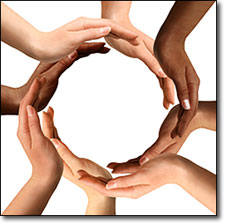By Ofer Zur, Ph.D.
Getting married is one of the most important decisions you make in your life, so the stakes are too high to leave to your love-crazed judgment. Yet most people fall in love, get engaged and tie the knot. The problem is that men and women make this crucial decision when they are consumed with desire and passion. Something must surely be missing in the process, as more than half of the marriages in the U.S. end up in divorce. Could the missing element be a dose of rationality and clarity?
If you are seriously looking for a partner, use the following checklist early in your courtship to help you make a sound and conscious commitment. This will increase the chances of your love and marriage flourishing and lasting.
Cushion the Blow: Falling Out of Love and Into Reality
Lovebirds tend to see the world in rosy colors. They feel wonderful, beautiful and, of course, happy. They tend not to be critical and are likely to ignore almost all warning signs, red flags and any advice that does not support their already-made decision. As a result, regretfully, most marriages do not survive the normal, natural phase of falling out of love and into reality.

I strongly suggest that you share this checklist with your future or potential spouse and other trusted friends and family members. Complete the checklist before you get engaged or set the marriage date. If you are already engaged, this checklist is just as important to help you improve your relationship. It is never too late to complete this list, as looking at these issues can strengthen your relationship at any level of commitment.
Please go over each item carefully and mark it off when you have completed a task. While this is primarily a personal tool, it is highly advisable that you go over the list upon its completion with your partner.
1. Explore His-Story or Her-Story
Become an investigative reporter or anthropologist and study the background, culture and values of your partner. Get to know your partner in a detailed way – explore the following areas and check the box to the left upon completion of each task or item.
- What was their home like when they grew up? Was it calm, loving, nurturing, or chaotic, volatile, silent, etc.?
- What influences, people and events shaped or affected their life?
- What are their main hopes for the future, what pleases them and what frightens them the most?
Their Attitudes And Expectations Regarding:
- Money, savings and lifestyle
- Friends of the opposite sex
- Friendships outside the marriage
- Infidelity and extramarital affairs
- Important political concerns and activism
- Health, illness and healing
- Involvement in the community
- Organized religion and spirituality
- Having children, and how many
- Discipline of children
- Raising the children in any type of religion or church
- Sex, romance and intimacy
- Marriage counseling and help in general
- Matters of the soul and spirituality
- Charity, volunteering and other selfless contributions
2. What Kinds of Modeling Did They Receive?

Explore the verbal and non-verbal messages given to your partner by their parents, siblings, grandparents, etc. in regard to how men and women are and how they should treat each other. Find out who their role models are, what ideals they hold, or what their favorite romantic movies, plays, novels or poems they have been exposed to, regarding the ‘perfect’ or ‘ideal’ marriage.
Then Find Out The Specifics About Their Parents, Such As:
- Did father and mother treat each other with respect?
- If they divorced, over what?
- Did mother always complain?
- Did father seem indifferent or angry?
- Did they sleep in the same room?
- Did they share power or was one dominant?
- Was either partner physically or verbally abusive?
- Were they receptive to help when needed?
- Were they honest and loyal to each other?
- Were they open or repressed about their bodies?
- Were they openly affectionate with each other?
- Were they intimate throughout their marriage?
- How did they change as they grew older?

For better or for worse, most marriages tend to repeat aspects of the parents’ marriages. Notice what was transmitted down through the generations and discuss it carefully with your partner.
3. Their Intimate History
The best predictor of future behavior is past behavior. Explore your partner’s patterns of behavior in past relationships. You can go about it by questioning your partner or your partner’s family and friends.
It may even be appropriate for you to personally talk to former partners yourself.
Then Find Out The Specifics About Past Relationships, Such As:
- Have they been loyal?
- Did they drink or use drugs?
- Did they argue openly?
- How did they argue?
- Were the relationships calm or volatile?
- Were they respectful of their partner?
- How did it end?
Changing patterns is possible but not easy. If you discover a certain pattern (such as name-calling, drinking, affairs), make sure that you have clear evidence whether, if and how they changed (e.g., AA, counseling). Don’t ever just take their word for it (e.g., “I’m different now” or “I will never do that to you because I love you!”).
4. How Do The Deal With Conflict?
Without creative conflict, mature love is difficult. Successful marriages include innovative conflict. Identify your partner’s style of conflict (e.g., explosive, terroristic, avoidance, passive/aggressive).
- Do they compromise or accept outside help?
- Do they sometimes say “Sorry”?
- Do they fight to win, to be right or for true resolution?
- Do they use verbal or physical threats?
- Do they carry a grudge long after the argument is over?
- Do they avoid conflict by all means?
- Is the sheer idea of conflict scary?
5. Create an Advisory Committee or Community of Care

While the following suggestions may seem cold and not too romantic, they are, in fact, loving and above all helpful in creating long lasting romance. It is an attempt to bring back some of the useful old tradition in which families and communities used to be involved (often too much) in the marriage arrangement. Being in love feels wonderful, but at the same time it blinds. One way to deal with being ‘love struck’ yourself, is to create your own informal advisory committee.
Ask each of the committee members (I recommend 4-7) to give you their honest impressions and concerns about your potential spouse. Listen non-defensively to what each of them tells you. The goal here is to let yourself be informed by the views of your trusted friends and family. If several people are concerned about your partner’s drinking, history of cheating, etc., honestly consider whether your partner has grown into someone you want to be with long-term. Do not dismiss such concerns; listen to the message, not the messenger. Be especially aware of any concerns by your committee that make you feel angry or defensive – this is a likely sign that you are trying to brush over something important.